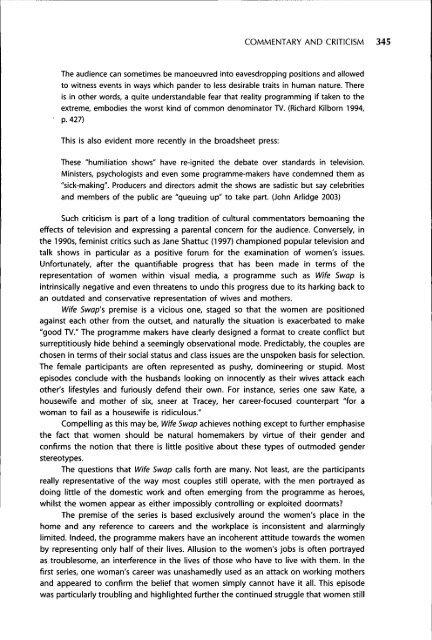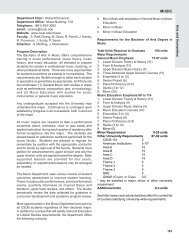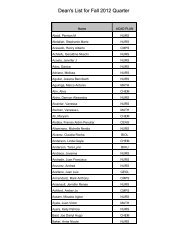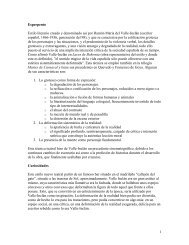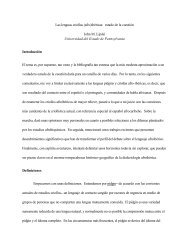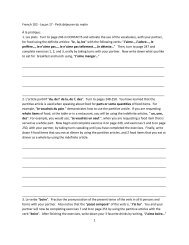Article 1: "Women's Work: Wife Swap and the Reality Problem."
Article 1: "Women's Work: Wife Swap and the Reality Problem."
Article 1: "Women's Work: Wife Swap and the Reality Problem."
You also want an ePaper? Increase the reach of your titles
YUMPU automatically turns print PDFs into web optimized ePapers that Google loves.
COMMENTARY AND CRITICISM 345<br />
The audience can sometimes be manoeuvred into eavesdropping positions <strong>and</strong> allowed<br />
to witness events in ways which p<strong>and</strong>er to less desirable traits in human nature. There<br />
is in o<strong>the</strong>r words, a quite underst<strong>and</strong>able fear that reality programming if taken to <strong>the</strong><br />
extreme, embodies <strong>the</strong> worst kind of common denominator TV. (Richard Kilborn 1994,<br />
• p. 427)<br />
This is also evident more recently in <strong>the</strong> broadsheet press:<br />
These "humiliation shows" have re-ignited <strong>the</strong> debate over st<strong>and</strong>ards in television.<br />
Ministers, psychologists <strong>and</strong> even some programme-makers have condemned <strong>the</strong>m as<br />
"sick-making". Producers <strong>and</strong> directors admit <strong>the</strong> shows are sadistic but say celebrities<br />
<strong>and</strong> members of <strong>the</strong> public are "queuing up" to take part. (John Arlidge 2003)<br />
Such criticism is part of a long tradition of cultural commentators bemoaning <strong>the</strong><br />
effects of television <strong>and</strong> expressing a parental concern for <strong>the</strong> audience. Conversely, in<br />
<strong>the</strong> 1990s, feminist critics such as Jane Shattuc (1997) championed popular television <strong>and</strong><br />
talk shows in particular as a positive forum for <strong>the</strong> examination of women's issues.<br />
Unfortunately, after <strong>the</strong> quantifiable progress that has been made in terms of <strong>the</strong><br />
representation of women within visual media, a programme such as <strong>Wife</strong> <strong>Swap</strong> is<br />
intrinsically negative <strong>and</strong> even threatens to undo this progress due to its harking back to<br />
an outdated <strong>and</strong> conservative representation of wives <strong>and</strong> mo<strong>the</strong>rs.<br />
<strong>Wife</strong> <strong>Swap</strong>'s premise is a vicious one, staged so that <strong>the</strong> women are positioned<br />
against each o<strong>the</strong>r from <strong>the</strong> outset, <strong>and</strong> naturally <strong>the</strong> situation is exacerbated to make<br />
"good TV." The programme makers have clearly designed a format to create conflict but<br />
surreptitiously hide behind a seemingly observational mode. Predictably, <strong>the</strong> couples are<br />
chosen in terms of <strong>the</strong>ir social status <strong>and</strong> class issues are <strong>the</strong> unspoken basis for selection.<br />
The female participants are often represented as pushy, domineering or stupid. Most<br />
episodes conclude with <strong>the</strong> husb<strong>and</strong>s looking on innocently as <strong>the</strong>ir wives attack each<br />
o<strong>the</strong>r's lifestyles <strong>and</strong> furiously defend <strong>the</strong>ir own. For instance, series one saw Kate, a<br />
housewife <strong>and</strong> mo<strong>the</strong>r of six, sneer at Tracey, her career-focused counterpart "for a<br />
woman to fail as a housewife is ridiculous."<br />
Compelling as this may be. <strong>Wife</strong> <strong>Swap</strong> achieves nothing except to fur<strong>the</strong>r emphasise<br />
<strong>the</strong> fact that women should be natural homemakers by virtue of <strong>the</strong>ir gender <strong>and</strong><br />
confirms <strong>the</strong> notion that <strong>the</strong>re is little positive about <strong>the</strong>se types of outmoded gender<br />
stereotypes.<br />
The questions that <strong>Wife</strong> <strong>Swap</strong> calls forth are many. Not least, are <strong>the</strong> participants<br />
really representative of <strong>the</strong> way most couples still operate, with <strong>the</strong> men portrayed as<br />
doing little of <strong>the</strong> domestic work <strong>and</strong> often emerging from <strong>the</strong> programme as heroes,<br />
whilst <strong>the</strong> women appear as ei<strong>the</strong>r impossibly controlling or exploited doormats?<br />
The premise of <strong>the</strong> series is based exclusively around <strong>the</strong> women's place in <strong>the</strong><br />
home <strong>and</strong> any reference to careers <strong>and</strong> <strong>the</strong> workplace is inconsistent <strong>and</strong> alarmingly<br />
limited. Indeed, <strong>the</strong> programme makers have an incoherent attitude towards <strong>the</strong> women<br />
by representing only half of <strong>the</strong>ir lives. Allusion to <strong>the</strong> women's jobs is often portrayed<br />
as troublesome, an interference in <strong>the</strong> lives of those who have to live with <strong>the</strong>m. In <strong>the</strong><br />
first series, one woman's career was unashamedly used as an attack on working mo<strong>the</strong>rs<br />
<strong>and</strong> appeared to confirm <strong>the</strong> belief that women simply cannot have it all. This episode<br />
was particularly troubling <strong>and</strong> highlighted fur<strong>the</strong>r <strong>the</strong> continued struggle that women still


